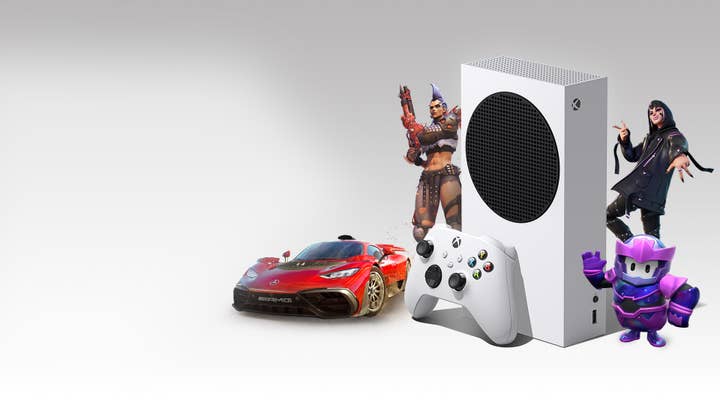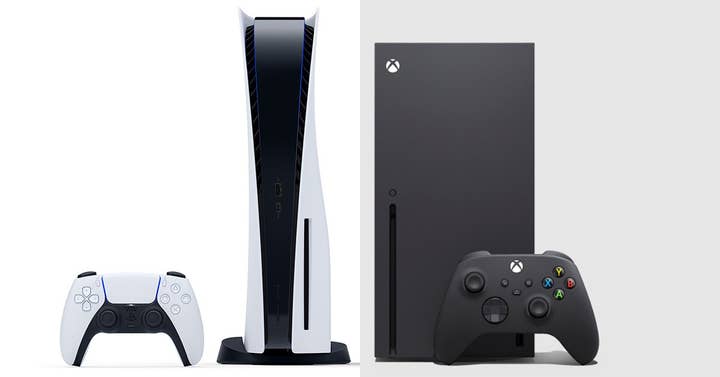For Sony and Microsoft, revenue growth is more important than any "console war" | Opinion
The framing of the "console war" seems less and less relevant as both companies chase bigger fish
Not so long ago, the announcement that Sony didn't have any new entries in its major first-party franchises in the pipeline for the coming year would have been viewed as an extraordinary opportunity for Microsoft to gain ground on the market leader.
There are many reasons why Xbox has faced an uphill struggle against its major rival. Brand strength and digital library lock-in are certainly among them, but the ultimate, seemingly insurmountable barrier was Sony's first-party studio system, which delivered an extraordinary line-up of hit software throughout the PS4 era and carried over into the current generation seemingly without stumbling – until now.
Microsoft's own difficulties in building a portfolio of studios that could rival that line-up is well documented; its travails were constantly magnified by unflattering comparisons with PlayStation's studios seemingly humming along and turning out a steady supply of hit games. By some interpretations, at least, Microsoft has now spent the better part of $100 billion dollars trying to close that gap – becoming, in the process, one of the biggest game publishers in the world.
It's not clear how exactly Sony has managed to mess up so badly as to leave a year-long gap in its major release pipeline right in the middle of the generation, at a crucial point where high-profile releases play a key role in sustaining installed base growth. There's probably a confluence of factors at play here.
2024 is going to be a tough year for releases generally due to a ripple effect from pandemic-era delays. That's an effect being felt across the whole industry, but for Sony more specifically, it's fair to wonder if the company's hard left turn into live service gaming – a top-down strategic pivot that looks more short-sighted and misguided by the day – might also be playing havoc with its ability to deliver a steady flow of software for its platform.
Whatever the underlying causes, the effect is the same – it's going to be a remarkably quiet year for PlayStation. The longer that drought continues, the harder it's going to become to ignore the voices which point out how many of the PS5's major games are actually PS4 remakes or cross-generation titles.
The longer that drought continues, the harder it's going to become to ignore the voices which point out how many of the PS5's major games are actually PS4 remakes or cross-generation titles
The market leader's stumble is an opportunity for its rivals though, right? That's the logic of the "console war" framing, at least; Sony's weakness is Microsoft's opportunity. This is a year-long window in which Microsoft can draw focus to its own games without being subjected to constant comparison to its rival's line-up; an opportunity to consolidate its acquisitions, beat the drum for Game Pass, and inject some life back into the moribund competition between the PS5 and the Series X/S consoles.
All of that remains true, at least to some extent – and Microsoft will no doubt make at least some hay while this fortuitous sun is shining on it. A hardware refresh for the Series X seems to be on the way this year, for example, which judging from leaked information looks significantly more interesting than Sony's deeply lacklustre hardware update for the PS5, and should help to drive at least some sales.
The process of pushing Activision Blizzard's library onto Game Pass is also likely to generate some positive attention over the course of the year. These things would be good for Microsoft's position in the market at any time; in a year when Sony has little to offer, they'll be even more effective than usual. The traditional logic of platform holder competition hasn't disappeared entirely.
And yet, it's hard to escape the sense that we're not in that console war paradigm any more; that what would once have been seen as a major stumble by Sony is now eclipsed by the broader problems faced by the market as a whole. It's remarkable timing that Sony's admission that the software pipeline has been allowed to run dry came in the same week that Xbox fans were steeling themselves for the possibility that Microsoft might be about to abandon platform exclusivity and put its major titles on Sony and Nintendo's consoles.
That didn't happen – only the most conspiratorial of gaming influencers, whipping up interest in their coverage by making wild implications, actually pushed the idea that Microsoft could go the way of Sega and abandon hardware altogether, but there was certainly a widespread belief that the company's multiplatform ambitions would be more far-reaching than what was eventually announced, namely that four as-yet-unnamed titles, all at least a year old, will be launching on other platforms.

This is an evolution of Microsoft's prior strategy, not a revolution – the company already sells and operates many games on rival platforms, grandfathered in through the various publishers and developers it has bought in recent years, so expanding this to include some more titles isn't all that dramatic.
However, the week of wild speculation (which Microsoft either deliberately or unknowingly encouraged by pre-announcing a business update rather than simply issuing a quick statement) did focus attention on the core tension at the heart of Microsoft's games business – namely the fact that their acquisition spree has ended up tethering one of the industry's leading games publishing businesses to a console hardware business that's in distant third place behind its rivals.
This tension restricts Microsoft's manoeuvring significantly. If it focuses all of the efforts of its acquired studios and publishers (within the confines of the agreements it was forced into to win regulatory approval for the Activision Blizzard deal, of course) on supporting the Xbox consoles with exclusive software, it will certainly grow the hardware installed base – but in the process it will crash the revenues of its studios by denying them the ability to sell games on the more successful consoles.
That won't fly with Microsoft's upper management, who expect a return on their enormous investment, and approved the Activision Blizzard deal at least in part because it would be instantly additive to the company's bottom line.
That competition feels like a distraction for both companies, a huge investment of resources that could be better put to use in trying to figure out where the next big market expansion might come from
On the other hand, if it focuses entirely on that aspect – improving revenues from the gaming division such as to keep growing it as a pillar of Microsoft's business, without worrying about the strategic implications for Xbox – then it risks losing out on its platform ambitions, and locking itself into a future of having to pay a 30% share of a very large part of its gaming revenue to Sony or Nintendo. Catch-22.
Neither option is palatable; Microsoft wants to find a third way, and is navigating between two objectives that are far from easy to reconcile.
This is pretty new ground for the "console war" – so much so that I'm not sure the console war framing is even especially useful in understanding what's happening here. The thing is, Sony faces a similar set of questions on its side of the aisle.
It's in a stronger position in some regards – it has a console platform with a much larger installed base, after all – but the core challenges are the same. Sony's lack of major titles in the coming year is its own screw-up, but over the longer term, there's a big question over how the company grows its gaming revenue – a question that's become more and more pressing as console installed bases have remained stubbornly capped somewhere in the 100 to 120 million range over the past decade or so.
There's only so much money to be extracted from a static customer base; the question of where Sony's next big growth spurt in gaming is going to come from is a more thorny and existential one for the company than anything to do with competition with Microsoft. If anything, that competition – over a market that seems to lack growth potential – feels like a distraction for both companies, a huge investment of resources that could be better put to use in trying to figure out where the next big market expansion might come from.
Consequently, just as Microsoft is trying to figure out its strategy – and its messaging – for a cross-platform future of some kind, Sony is also juggling the same concerns, with its launches of first-party games on PC, its acquisition of Bungie, and its (possibly misguided) live service ambitions all pointing to a future where Sony games exist well beyond the PlayStation hardware.
None of this is to say that competition between Sony and Microsoft will disappear; Microsoft would dearly love to have Sony's console installed base and Sony will work hard to avoid losing that position. However, it feels more and more like the "console war" is a sideshow. The real priority for both of these companies is figuring out how to grow out of the evolutionary niche in which AAA gaming has found itself – and on the way to that objective, strategies that might seem insane from the perspective of the "console war" have found themselves firmly back on the agenda.









